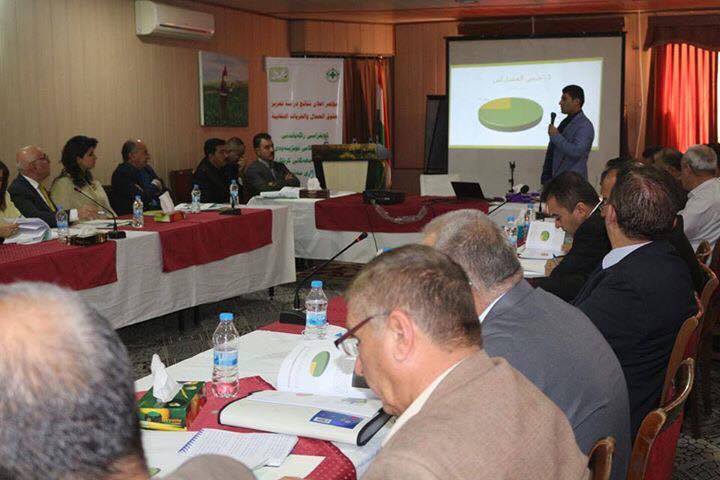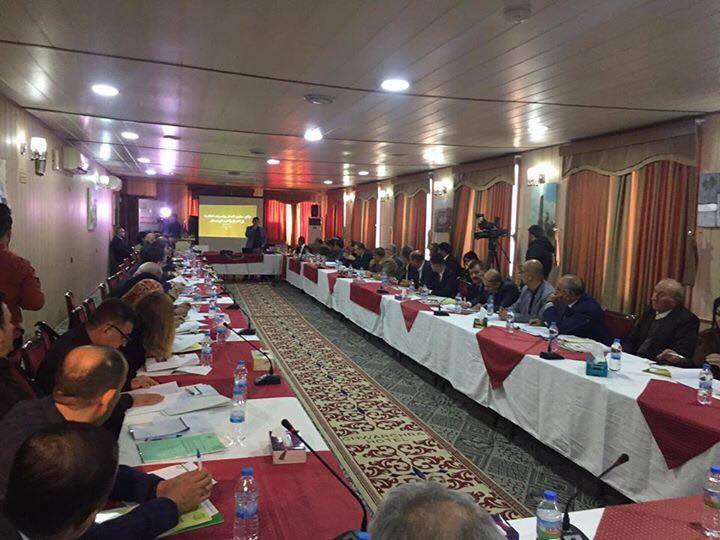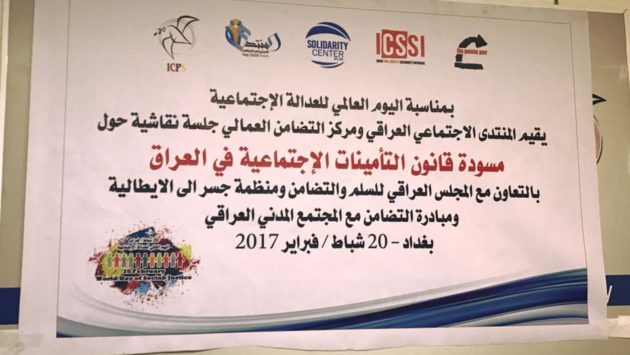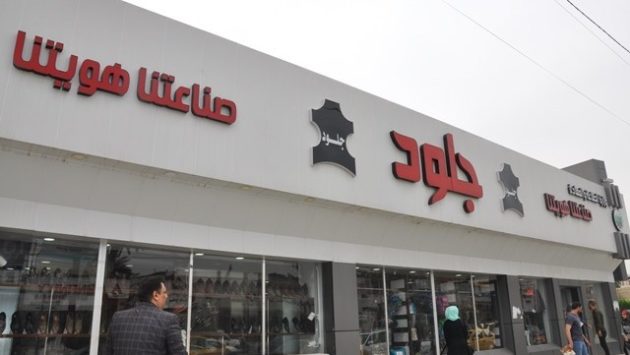The Condition of Workers’ Rights and Freedom of Labor Union in Kurdistan Region and Iraq
“Workers’ Rights and Freedom of Association” is a joint project run by PFOK and NPA in Iraq and the Kurdistan Region. The project, which has an implementation period of four years, began in July 2016. A number of researchers from PFOK have conducted a study of the project between July and December of 2016. By using a mixed methods approach, this study tries to reveal the workers’ conditions and the freedom of association and unions in a legal and social framework. The research tools that have been used in the data collection are individual interviews, focus group discussions and questionnaires. Data collection has taken place in the cities of Baghdad, Erbil, Basrah, Sulaymaniyah, Kirkuk and Duhok.
In order to know more about the conditions of workers, 1000 questionnaires have been shared purposely with workers in these six cities. However, only 780 of these workers met the definition of worker for our study, thus only they have been marked as participants. Secondly, 43 semi-structured interviews were conducted with related people who are: one Parliament member, 12 government representatives, 16 syndicate representatives, two employers, eight workers, two academies and two law experts. Moreover, six focus groups were conducted in all six cities to know more about the workers’ condition and freedom of unions. Most of the participants were relevant to our study and 67 persons took part in the discussions.
Demographically, 76% of the participants are males and 24% are female. The participants who are between 19 to 28 years old make up 50% of the sample. Those who are older than 58 years old make up 1% of the targeted population. At 59%, most of the workers in our survey are married, 34% are single, 4% are divorced and 3% represent the demographic of those whose partners have died. The breakdown of participant’s location is as follows: 21% from Baghdad, 19% from Erbil, 21% from Basrah, 21% from Sulaymaniyah, 10% from Duhok and 8% from Kirkuk. Education levels of the participants differed, though most are literate and fall in the middle of the educational hierarchy, at 28% of the sample. Participants with primary education background make up 23% of the sample. Those who have university degrees make up 15% of the sample and another 15% have high school certificates. Those who have diplomas represent 11% of the sample, while 6% of the sample is illiterate. Lastly, only 2% stated that they have graduate school degrees. The study consists of 67 participants, and the demographics used in this survey were quite broad. Survey and focus group participants were drawn from representatives of many diverse groups, organizations and professions across the country. For example, survey participants and focus groups included three members of parliament, eleven government representatives, twenty-two representatives of workers syndicates, four activists, twelve academics, two governorate council representatives, and one representative of the Chamber of Trade. Regarding participants locations: ten participants are from Baghdad, eight from Erbil, nine from Basrah, fourteen from Sulaymaniyah, sixteen from Kirkuk and ten from Duhok.
The most important conclusions drawn from this study are related to workers’ employment contracts and social insurances. In fact, the study found that most workers do not have contracts or social insurance despite laws mandating these benefits and rights. In addition, the study also concluded that obstructing the joint committees of the government and the syndicates as well as lack of logistical support of these committees have led most committees to not sufficiently follow up and investigate workers’ life in their workplaces. The study also found that violations against workers are very high, especially violations against wages, working hours, overtime and vacation time. In other words, workers are being denied guaranteed rights, mandated compensation rates, and are being forced to work overtime; and the wages they gain are incompatible with their lifestyle. More to the point, neither the government and the syndicates nor the employers have attempted to upgrade workers’ vocational skills and awareness. Furthermore, the research discovered that although the workplace space and safety supply are in good condition, some workers still encounter critical or hazardous conditions, such as death in their workplaces. It was also found that workers sometimes do not defend their rights against their employers for fear of losing their jobs. Moreover, according to the study, employers contravene the rights of foreign workers, and these laborers often face discrimination in their workplaces. It is obvious that establishing the rights of workers is contingent on the awareness of laborers towards their rights. Workers still do not have the awareness to claim their own rights. Most of them are oblivious to the rights and rules of workers, and they do not know how to get benefits from the rules and laws pertaining to workers’ rights to assert their privileges. The study found there is not a satisfactory relationship between laborers and the workers syndicates.
A very small proportion of workers have memberships in the workers syndicates. Plus, a sizable proportion of them often do not partake in the activities of the syndicates. This is due to the fact that they do not trust these syndicates to protect and secure their rights. In addition, one of the reasons why workers do not agree with these syndicates is due to the political interference in the administrations and election of the representatives for these syndicates. This interference, according to most laborers, is a main factor that restricts the activities and freedom of the syndicates.
There preventatives of the syndicates also consider the aforesaid factors to impede their activities and administration of their syndicates. Also, some other existing rules pose obstacles to the freedom of the syndicates. One of the obstacles is that there are no rights available to allow multi-syndicates. In addition, the government is very slow in both issuing new instructions and implementing the rules and laws. This has hindered the syndicates of workers to satisfactorily claim the rights of workers. In other words, the rules and laws pertaining to the rights of laborers and syndicates are highly efficient in that if they are properly and adequately implemented, they can efficiently assert workers’ rights. However, not employing the rules and regulations properly proves an obstacle to attaining and/or securing workers’ rights.
The conclusions drawn from this study should offer government officials and authorities a blueprint for how to painstakingly improve the life of workers and how to upgrade the workers syndicates as well as those rules and regulations relevant to them. For this reason, the government should amend the labor and social insurance laws in Kurdistan in accordance with international standards. Furthermore, the government should issue new instructions on how to adequately implement labor laws in Iraq and Kurdistan in conformity with other laws and principles in the country. More to the point, mass media and other vocational trainings should also play an important role in familiarizing workers with their rights as well as with labor laws and regulations. More importantly, the workers syndicates should also play a pivotal role in protecting and securing the rights of workers. For this reason, the role of the syndicates should be more active so that they can truly represent the rights of workers. The relationship between the syndicates and workers should be more expanded and developed in order to restore and promote workers’ trust in these syndicates.
Government oversight and investigations should be better upgraded to efficiently play their own roles in society. In this case, the government in Iraq should allow the committees to be more active, and the number of the follow-up committees in both Iraq and Kurdistan should be increased. Further, the committees need to be provided with more logistic supports. The government has also to issue new instructions (i.e., official letters and documents pertaining to labor laws) on how employers should work accordingly. Efforts should be made to allow labor courts to actively play their roles in protecting and securing workers’ rights against any potential violations. More to the point, labor courts should be established in those areas where courts are not obtainable. Further, the government needs to cut out all those bureaucracies and court sittings that pose an obstacle to better serving workers. Contemporary laws have to be passed in accordance with international standards to recognize the syndicates’ freedom. In doing so, the role of the syndicates would be better ameliorated. In other words, serious efforts need to be made to eliminate such obstacles as political meddling to achieve more freedom for the workers syndicates. More organizations and associations related to workers’ affairs also have to be established.
In addition, it is evident that civil society organizations in Kurdistan and Iraq have key roles in society. For this reason, they should be greatly encouraged to mainly concentrate on working class people through their future projects. In doing so, this class will be more active and better served in society. Furthermore research needs to be conducted to better understand the life of workers and the freedom of the workers syndicates.
Moreover, women have to be provided with more opportunities to actively partake in leading and representing the workers syndicates. Mass media should help raise people’s awareness of the problems and challenges encountered by workers. It is of paramount importance to surmount all the obstacles that stand in the way of investigating workers in their workplaces. These hindrances can only be overcome through various efficient mechanisms, which allow follow-up committees and civil society organizations to sufficiently investigate working class people in their workplaces. Governments in both Iraq and Kurdistan should be forced to abide by all the international rules and agreements pertaining to workers’ rights as well as the freedom of the syndicates. Further, serious efforts should be made to end all forms of discrimination, problems and challenges faced by foreign workers. It is also significant that the workers syndicates should operate according to the principles of democracy, and more opportunities should be provided for youths to actively play their role in the workers syndicates. Members of the syndicates need to be provided with more opportunities to improve their competencies through vocational training and career guidance. In all the syndicates, follow-up committees should be established to investigate all violations against workers. These committees also need to correctly enter any data related to workers, so that they can take advantage of such data to support workers either within or outside the country. Moreover, the government should reconsider workers to be members of public sectors in society. All workers need to be provided with safe workplaces, and all the committees have to better investigate the safety of workplaces and give new instructions to workers on how to protect themselves at work. This includes preparing the report of workers and their freedom of association in the Universal Periodical Report.
For more Information go to the link below:
Or visit PFOK website on the link below:
https://www.insightonconflict.org/conflicts/iraq/peacebuilding-organisations/pfok/





